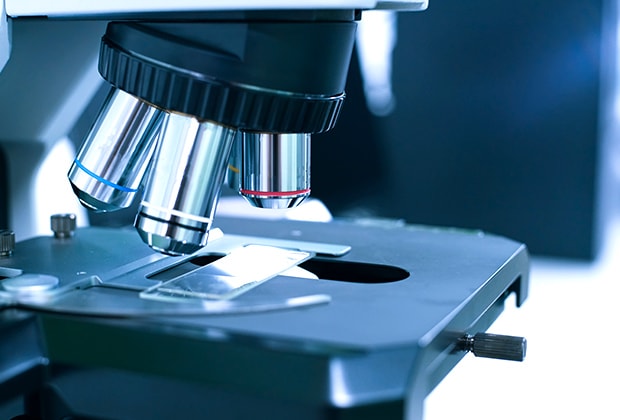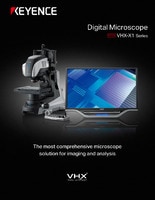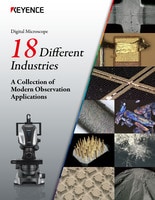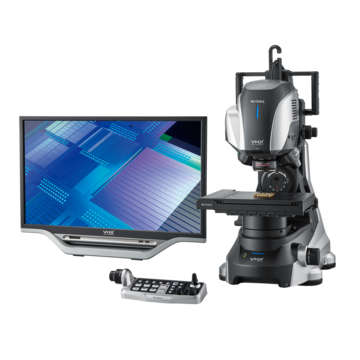Digital Microscopes
Microscope Optical Systems
Types of Lenses

Optical microscopes use a combination of objective and ocular lenses (eyepieces) for imaging. The observation magnification is the product of the magnifications of each of the lenses. This generally ranges from 10x to 1,000x with some models even reaching up to 2000x magnification.
Objective lens
The objective lens consists of several lenses to magnify an object and project a larger image. According to the difference of the focal distance, lenses of different magnifications are available, such as 4x, 10x, 40x, and 50x. In addition to the magnification, indexes to show the performance of an objective lens include the numerical aperture and the working distance.
Light transmitted through a lens generates color aberration (color bleeding), which has a different refractive index according to the wavelength. To prevent this, the following lenses have been developed:
- Achromatic lens
Lenses designed to make the refractive indexes of two wavelengths (colors) of light the same. This type of lens is widely used, partly due to its reasonable price. - Semi-apochromatic lens (fluorite lens)
Lenses designed to make the refractive indexes of three wavelengths (colors) of light the same. This type of lens is used for fluorescence observation because the transmission ratio is ensured for ultra-violet light with a wavelength of about 340 nm. - Apochromatic lens
Lenses designed to make the refractive indexes of three wavelengths (colors) of light the same, as with a semi-Apochromatic lens. This type of lens features a large numerical aperture and a better resolution and thus is often used for research that requires detailed observation. This high performance means the price is also higher. - Plan lens
A lens in which field curvature aberration is corrected so that not only the lens center but also the periphery are focused. If the lenses listed above have their field curvature aberrations corrected, they are respectively called plan achromatic lens, plan fluorite lens, and plan apochromatic lens. In most cases, "PLAN" is marked on the side of lenses. - Immersion lens
Increases the numerical aperture by filling liquid between the objective lens and the specimen to achieve a high resolution. An immersion lens that uses oil is called an oil immersion lens, and one that uses water is called a water immersion lens. The former is marked "HI" or "OIL" on the side and the latter "W" or "WATER".
Ocular lens (eyepiece)
A lens to be mounted on the observer side. The image magnified by the objective lens is further magnified by the ocular lens for observation. An ocular lens consists of one to three lenses and is also provided with a mechanism, called a field stop, that removes unnecessary reflected light and aberration.
Different types are available according to the magnification they provide, such as 7x and 15x. In addition to magnification, the performance of a lens is represented by the field number, which shows the range of the field-of-view.
As opposed to objective lenses, the higher the magnification of the ocular lens, the shorter the length.
The following lenses are available according to the structure of the field stop or application:
- Huygens lens
Consists of two plano-convex lenses. This type of lens is used for low magnification and is characterized by the field stop located in the lens tube. - Ramsden lens
This type of lens is characterized by the field stop located outside the lens tube. - Periplan lens
Corrects chromatic aberration of magnification and other properties to allow clear observation, even at the periphery of the field-of-view. - Compensation lens
An ocular lens that compensates for the aberration caused by an objective lens. - Wide-field lens
Ensures a wide field-of-view and is primarily used for observation of living organisms and minerals. - Super-field lens
Supports an even wider field-of-view and is mainly used with stereoscopic microscopes.
Condenser lens
A lens to be mounted under the stage. This lens can adjust the amount of light to uniformly illuminate objects. It is useful for observation at high magnification. There are various types of condenser lenses, ranging from general "abbe condensers" to "achromatic condensers" that correct color aberration.
- Abbe condenser
A simple condenser lens that is often used on microscopes installed in educational institutions. - Achromatic condenser
A condenser lens that corrects color aberration. Achromatic aplanatic condenser lenses are available as an advanced type that can correct field curvature. - Universal condenser
Supports a wide range of observation, such as darkfield, phase contrast, differential interference contrast, and polarized light observation.
About magnification
The total observation magnification is represented by the product of the magnifications of the objective and ocular lenses. For example, an objective lens of 20x and an ocular lens of 10x make the total magnification 200x.
A magnification of 1x refers to the status where an object is viewed with the eye from a distance of 250 mm. 250 mm is regarded as the distance that can be viewed most easily by the human eye. This is called the distance of distinct vision. The magnification of an ocular lens is obtained by dividing the distance of distinct vision by the focal length of the lens.
We’re here to provide you with more details.
Reach out today!

Cleaning Lenses
It is important to clean a microscope of dirt, oil, and stains after use because the lens can easily catch dirt, fingerprints, or culture solution during operation.
How to clean lenses
The following tools are mainly required for cleaning:
- Blower (compressed air)
- Lens cleaning paper
- Cotton swabs
- Cleaning agent (those recommended by the manufacturer, absolute alcohol, mixture of ether and alcohol, distilled water, etc.)
-
1Cleaning with a blower or other device
First, remove the dust and dirt on the lens with a blower or compressed air.
(Compressed air should not be used for some lenses due to its high air pressure. Please refer to the operation manual when deciding whether to use it.) -
2Removing stains
Use a cleaning agent such as the one recommended by the manufacturer, absolute alcohol, mixture of ether and alcohol, or distilled water. Eyeglass cleaner should not be used because it contains defogger.
When using a flammable cleaning agent such as ether, be careful it doesn't ignite. You should turn off the surrounding electronic equipment beforehand. Also pay attention to ventilation in the room.
Apply a small amount of cleaning agent to a dust-proof material such as gauze, non-woven cloth, or cleaning paper, and gently wipe the lens from the center to the outer circumference in a spiral pattern. For a small lens, wind lens paper around the tip of a cotton swab and wipe the lens without applying much force.
The above cleaning procedure can also be used for condenser lenses.
After using an oil immersion objective lens, be sure to clean it; otherwise the lens surface will deteriorate. Absorb the remaining oil with cleaning paper and then gently wipe the lens with cleaning paper dampened with cleaning agent.
We’re here to provide you with more details.
Reach out today!





